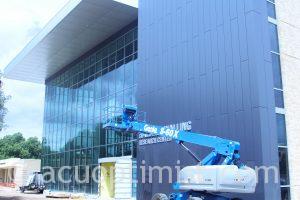
The after event of the grand opening of Dillard Hall.
Newly-opened Dillard Hall officially opened in a ribbon-cutting ceremony Aug. 19.
Construction on the sophomore women’s residence hall began in March when the university purchased the non-profit senior living center, Christian Village, through a donation from Max and Gayle Dillard.
The renovation cost $2 million and included new wiring, plumbing, flooring and furniture.
“I can’t wait to see the incredible role that Dillard Hall plays in helping us fulfill our mission in educating students for Christian service and leadership throughout the world,” Dr. Phil Schubert said during his speech at the residence hall’s ribbon-cutting.
Steven Holley, vice president and chief business officer, oversees construction and said students are enjoying the large residence hall.
“There are 66 units and large common spaces,” Holley said. “At over 82,000 square feet, Dillard Hall is the largest residence hall on campus, and we are excited to bring it on line.”
Vision in Action updates

Construction on the Halbert-Walling Research Center continues. (Photo by Emily Guajardo)
Halbert-Walling Research Center is scheduled to host classes in January 2017. Holley said the renovations are moving along well with the primary structure of the building complete and workers now installing flooring and doors.
“Halbert-Walling is a very specialized building, being a science facility,” Holley said. “It has been challenging to make sure we are getting the appropriate equipment in the building so the professors will be able to provide the best experience possible for our students.”
The first phase of renovation, focused on the roof and exterior of the Robert R. and Kay Onstead Science Center is complete.The remaining portion will undergo renovation in January 2017, Holley said. Those renovations will include work on restrooms, select classrooms, hallways and an upgrade of the building’s systems.
Holley said the cost for both science buildings have not exceeded the budgeted $45 million.
The construction of Wildcat Stadium, an 8,500-seat football facility, began last spring and will be complete by September 2017, Holley said.
“The football stadium project and the corresponding track and soccer project has a cost of $50 million,” Holley said. “The track and soccer portion of the project is complete and within projections. It is early in the construction of the football stadium, but we are anticipating achieving that project cost.”
The ever-changing weather of Abilene has posed the most challenges for the construction projects, Holley said, but despite spells of dry and wet weather, all projects are set to be completed on time.
